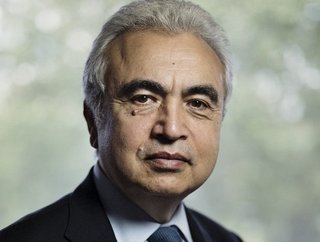The IEA reports energy efficiency must be doubled by 2030

The International Energy Agency (IEA) works with governments and industry leaders to shape a secure and sustainable energy future, providing authoritative analysis, data, policy recommendations and solutions to ensure energy security and help the world transition to clean energy.
The IEA is made up of 31 member countries and 13 association countries, with four accession countries currently working towards membership — Chile, Colombia, Israel and Latvia.
Member countries must also be a member of the Organisation for Economic Co-operation and Development (OECD), an international intergovernmental organisation of 38 countries committed to democracy and the market economy, alongside demonstrating several requirements.
The IEA is leading a new era of international energy co-operation through focussing on technology, partnerships and training.
Partnering in technology to support the global energy transition
The IEA’s technology programme provides the basis for international public and private research partnerships, supporting the work of independent, international groups of experts that enable governments and industries from around the world to lead programmes and projects on a wide range of energy technologies and related issues.
The experts in these collaborations provide an expansive breadth of analytical expertise to advance the research, development and commercialisation of energy technologies, providing a unique asset to the global transition to a cleaner energy future.
These collaborations involve over 6,000 experts worldwide who represent nearly 300 public and private organisations located in 55 countries, including many from IEA Association countries such as China, India and Brazil.
Projects within the ‘Today in the Lab, Tomorrow in Energy’ collection include:
- Realising methanol’s potential as a motor fuel
- Unlocking the potential of bioenergy with carbon capture and utilisation or storage (BECCUS)
- Overcoming the challenges of combining combustion fuels with low-carbon fuels
- More flexibility for more renewables in grid-connected heat supply
- High-performance transport materials for thermally sensitive vaccines
- Very large thermal energy storage for renewable districts
- Capturing the energy beneath our feet
- Demonstrating the potential of heat pumps in multi-family buildings
- Proving the viability of underground hydrogen storage
- Hydrogen meets batteries: hydrides for solid state batteries
The International Energy Agency (IEA) works with governments and industry leaders to shape a secure and sustainable energy future, providing authoritative analysis, data, policy recommendations and solutions to ensure energy security and help the world transition to clean energy.
The IEA is made up of 31 member countries and 13 association countries, with four accession countries currently working towards membership — Chile, Colombia, Israel and Latvia.
Member countries must also be a member of the Organisation for Economic Co-operation and Development (OECD), an international intergovernmental organisation of 38 countries committed to democracy and the market economy, alongside demonstrating several requirements.
The IEA is leading a new era of international energy co-operation through focussing on technology, partnerships and training.
Partnering in technology to support the global energy transition
The IEA’s technology programme provides the basis for international public and private research partnerships, supporting the work of independent, international groups of experts that enable governments and industries from around the world to lead programmes and projects on a wide range of energy technologies and related issues.
The experts in these collaborations provide an expansive breadth of analytical expertise to advance the research, development and commercialisation of energy technologies, providing a unique asset to the global transition to a cleaner energy future.
These collaborations involve over 6,000 experts worldwide who represent nearly 300 public and private organisations located in 55 countries, including many from IEA Association countries such as China, India and Brazil.
Projects within the ‘Today in the Lab, Tomorrow in Energy’ collection include:
- Realising methanol’s potential as a motor fuel
- Unlocking the potential of bioenergy with carbon capture and utilisation or storage (BECCUS)
- Overcoming the challenges of combining combustion fuels with low-carbon fuels
- More flexibility for more renewables in grid-connected heat supply
- High-performance transport materials for thermally sensitive vaccines
- Very large thermal energy storage for renewable districts
- Capturing the energy beneath our feet
- Demonstrating the potential of heat pumps in multi-family buildings
- Proving the viability of underground hydrogen storage
- Hydrogen meets batteries: hydrides for solid state batteries
International organisations ensuring secure, affordable and sustainable energy
The IEA works with a broad range of international organisations and forums to ensure secure, affordable and sustainable energy systems, co-operating with a broad range of international organisations and forums working in the field of energy.
It plays host to a number of multilateral organisations at its headquarters in Paris, including the Clean Energy Ministerial (CEM) Secretariat and the Energy Efficiency Hub, alongside its role as the facilitator for the BioFuture Platform.
The IEA also supports energy-related work of the G20, G7 and G8, as well as Mission Innovation. It plays an active role in discussions with producer economies and with the Organization of the Petroleum Exporting Countries (OPEC), particularly within the International Energy Forum (IEF). The IEA regularly advises in expert discussions at the Conference of Parties (COP) of the United Nations Framework Convention on Climate Change (UNFCCC), and works with other major global energy groups and organisations.
Educating the world on energy developments
Interactive training around the world on energy statistics, modelling, technology, energy efficiency and renewable policies, aims to establish ongoing working relationships with participating countries for continual capacity building, as well as two-way information exchange.
The IEA has carried out training activities since its creation more than 40 years ago, starting with the Emergency Response Exercises (ERE) for its member countries to prepare them for oil supply disruptions. Over the decades, the scope for training has broadened to include energy statistics, modelling, technology, energy efficiency and renewable energy policies and subjects of similar interest. With the globalisation of energy markets and the global consequences of climate change, the IEA works with an increasing number of countries.
Looking to the future of global energy
The IEA reports that global progress on energy efficiency needs to double between now and 2030 to get on track to net-zero emissions by 2050 and stand a good chance of limiting global warming to 1.5°C.
Increasing annual energy efficiency progress from 2.2% today to over 4% by 2030 would lower CO₂ emissions from fuel combustion by almost 11 gigatonnes — almost one-third of current global energy consumption and emissions — found the report.
This goal was endorsed by 45 countries at the Global IEA Conference in June 2023, which was organised in partnership with Schneider Electric.
“It’s hard to overstate the importance of energy efficiency for strengthening energy security and keeping the goal of limiting global warming to 1.5 C within sight, so I’m delighted that countries from across the world are uniting around the IEA’s call to double energy efficiency progress by 2030,” says Dr Fatih Birol, Executive Director of the IEA.
“This can help drive stronger momentum behind efforts to achieve an ambitious outcome at COP28 in Dubai.”
******
For more energy insights check out the latest edition of Energy Digital Magazine and be sure to follow us on LinkedIn & Twitter.
You may also be interested in Sustainability Magazine and EV Magazine.
Please also check out our upcoming event - Sustainability LIVE in London on September 6-7 2023.
BizClik is a global provider of B2B digital media platforms that cover Executive Communities for CEOs, CFOs, CMOs, Sustainability Leaders, Procurement & Supply Chain Leaders, Technology & AI Leaders, Cyber Leaders, FinTech & InsurTech Leaders as well as covering industries such as Manufacturing, Mining, Energy, EV, Construction, Healthcare + Food & Drink.
BizClik – based in London, Dubai, and New York – offers services such as Content Creation, Advertising & Sponsorship Solutions, Webinars & Events.







